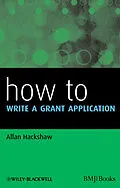This concise guide covers the important angles of your grant
application, whether for a health research project or personal
training programme, and will help you be among the successful
applicants.
The author, a reviewer for grant funding organisations and
internationally respected research scientist, gives you the benefit
of his experience from both sides of the process in this
easy-to-use, readable guide. The book takes you through the grant
application process, explaining how to:
* Present the justification for the proposed project
* Describe the study design clearly
* Estimate the financial costs
* Understand a typical review process, and how this can influence
the contents of the grant application
The author provides practical advice on a range of project types
(observational studies, clinical trials, laboratory experiments,
and systematic reviews) to increase the chance that your
application will be successful. There are also tips on what to
avoid throughout the application.
With generic information about application requirements,
How to Write a Grant Application is ideal for
healthcare professionals seeking a health services or scientific
grant.
Autorentext
Allan Hackshaw, Deputy Director of the Cancer Research UK and University College London Cancer Trials Centre, and Reader in Epidemiology and Medical Statistics, London, UK
Zusammenfassung
This concise guide covers the important angles of your grant application, whether for a health research project or personal training programme, and will help you be among the successful applicants.
The author, a reviewer for grant funding organisations and internationally respected research scientist, gives you the benefit of his experience from both sides of the process in this easy-to-use, readable guide. The book takes you through the grant application process, explaining how to:
- Present the justification for the proposed project
- Describe the study design clearly
- Estimate the financial costs
- Understand a typical review process, and how this can influence the contents of the grant application
The author provides practical advice on a range of project types (observational studies, clinical trials, laboratory experiments, and systematic reviews) to increase the chance that your application will be successful. There are also tips on what to avoid throughout the application.
With generic information about application requirements, How to Write a Grant Application is ideal for healthcare professionals seeking a health services or scientific grant.
Inhalt
Foreword.
Preface.
Acknowledgements.
About the author.
Chapter 1: Overview.
1.1 Types of grants.
1.2 Types of funding organisations.
1.3 Choosing an appropriate funding body.
1.4 Contents of the grant application.
1.5 Including several studies in one application (project
grants).
1.6 Translational research sub-studies.
1.7 The application process.
1.8 Estimating timelines and a planned work schedule.
1.9 Intellectual property.
1.10 Text, grammar and format.
Chapter 2: People involved in the study.
2.1 Who should be part of the Study Team?
2.2 Other investigators, collaborators and consultants.
2.3 The host institution and Sponsor.
2.4 Commercial companies.
2.5 Oversight committees.
Chapter 3: Justifi cation for the study.
3.1 Finding background information.
3.2 Previous evidence and similar research (why the study is
needed now).
3.3 Biological plausibility.
3.4 Safety of new interventions in clinical trials.
3.5 Feasibility.
3.6 What will the study contribute?
3.7 Summary of the justifi cation for a proposed study.
Chapter 4: Describing the study design.
4.1 Abstract.
4.2 Appendices.
4.3 Study objectives and outcome measures.
4.4 Types of studies.
4.5 Observational studies in humans.
4.6 Clinical trials in humans.
4.7 Laboratory experiments.
4.8 Describing sample size.
4.9 Describing the main statistical analyses.
4.10 Systematic reviews.
Chapter 5: Associated documents with the grant
application.
5.1 Study protocol.
5.2 Participant Information Sheet.
5.3 Curricula vitae of the Chief Investigator and all
co-applicants.
5.4 Letters of support from co-applicants, centre investigators,
collaborators, or other advisors.
5.5 Letters of support from commercial companies.
5.6 Other documents specifi c to the fi eld of research.
Chapter 6: Financial costs.
6.1 Overview of items to include in the fi nancial costs.
6.2 Indirect costs or overheads (full economic costs).
6.3 Per patient (or per subject) payments.
6.4 Staff costs.
6.5 Access to core funds and resources.
6.6 Consideration of costs not to be met by the funding
body.
6.7 Grant applications associated with calls for proposals.
6.8 Observational studies in humans.
6.9 Clinical trials in humans.
6.10 Laboratory experiments.
6.11 Systematic reviews.
Chapter 7: Funding body review process.
7.1 Submitting the application.
7.2 Processing the application within the funding body.
7.3 Initial reviews (external reviewers).
7.4 Funding committee meeting.
7.5 Funding committee evaluation.
7.6 Feedback to applicants after the meeting.
7.7 Responding to the funding committee feedback.
Chapter 8: Annual reports and applying for a grant
extension.
8.1 Annual reports.
8.2 Applying for a grant extension.
Bibliography.
Index.
